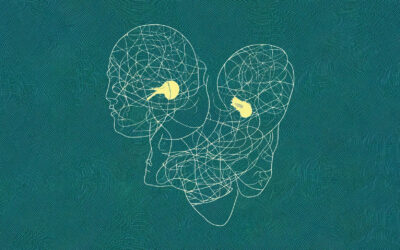In Douglas Adams’ comedy sci-fi novel ‘The Hitchhiker’s Guide to The Galaxy’, three characters build a supercomputer called ‘Deep Thought’ to provide the answer to life, the universe and everything. Deep Thought asks for seven and a half million years to think. After aeons of anticipation, the ancestors of the original programmers return to Deep Thought to finally hear the answer to life, the universe and everything
“‘Though I don’t think,’ added Deep Thought. ‘that you’re going to like it.’
‘Doesn’t matter!’ said Phouchg. ‘We must know it! Now!’
‘Forty-two,’ said Deep Thought, with infinite majesty and calm.’”
Deep Thought complained that it wasn’t a very good question anyway, so the answer may as well be 42. After this teleological letdown, the ancestors of the programmers realised they needed a better question, so they built the earth and all its life to function as a more powerful computer to come up with a better question. And that, claimed Adams, is why earth-humans spend our lives wondering about the meaning of life.
Like most of us, I have spent a lot of time pondering about the meaning of life. When I prepared my wedding speech (which is the bulk of this short essay), I wanted to take the time to express to my closest friends and family why I chose to marry my wife and how marriage can be an expression of life’s meaning. As a Christian, marriage is more than a way to formalise a special relationship. While marriage isn’t everything, it touches every part of us and goes to the very heart of what it means to be human. Even more than that, though, marriage paints a picture of our purpose in the universe and of God’s true nature. Marriage shows there’s a lot more to the meaning of life than 42.
What the answer isn’t
To start off, we all instinctively know that there’s a way to live which is right and moral. And I think a life of love fulfils that. On the other hand, despite all the twists and turns of history and all the progress of science – evil remains ugly and real, and it always opposes what’s good and true.
But atheism thinks it has invalidated God, and in its wake, we are left with the core belief that right and wrong, good and evil, are just ideas without any point of absolute reference. It’s easy to think we live consistently with our personal beliefs, but do we? If you take the denial of God’s existence to its logical conclusion then you must make sense out of a random first cause, deny that there are objective moral duties and claim that everything is meaningless yet express that in a meaningful way. If you really want to be a consistent atheist you’ll be left a nihilist, which just isn’t practical, and nihilism also destroys any justification for valuing Truth.
Now why do I say this? Not to start a debate but because contrary to the drift, it is the gospel that taught me that there is a purpose in life, there is a true reference for right and wrong and a moral law that underpins our existence. Your life has objective worth and you are infused with meaning because your creator loves you. He invites you into a relationship of love and integrity, he calls you to adopt responsibility.
Now none of us denies the inescapable role love plays in filling our lives with meaning, which explains why there is so much hurt and pain when love is lost. Love can’t truly be bought or sold yet is perhaps the most valuable quality of life. Without it life is dead.
But what is love?
Is love just a chemical condition of the brain, as atheism commonly claims? If you feel love, it’s only because that combination of chemicals enables you to better survive in order to pass on your genetic code. That’s apparently all love is – chemistry. So when you tell someone “I love you.” how meaningful is that if ultimately love is just the purposeless interaction of matter in a world of blind natural events? If we deny God, we deny any definite meaning undergirding life, and without meaning, we are compelled to deny love any transcendent value, or any true value at that. I can’t see any way around this.
And even though our films, music and art seem to revolve around a search for love, relationship breakdowns still seem like the norm. I’m tired of seeing heartbreak. Our idea of love is fatally flawed and the world is suffering because of it.
So what is the right ideal of love? For me, this is where the gospel steps in. Stepping into our suffering, broken, sometimes heartless world, Jesus demonstrated love by opening his arms on the cross. He took on our forsakenness, swapping his place for ours. He paid the judgement for our moral failures. I am reminded by the words of one theologian, “when we behold the disfigurement of the Son of God, when we find ourselves appalled by His marred appearance, we need to reckon afresh that it is upon ourselves we gaze, for He stood in our place.” Jesus shows us that love is an undeserved gift. God doesn’t need anything, he doesn’t need you. He is utterly transcendent, yet He is still looking to build a family, and he is willing to pay the price to redeem you for that.
In the bible, John wrote:
“This is how we know what love is: Jesus Christ laid down his life for us. And we ought to lay down our lives for our brothers and sisters. If anyone has material possessions and sees a brother or sister in need but has no pity on them, how can the love of God be in that person? So let us not love with words or speech but with actions and in truth.”
What a high standard! Love is more than just a feeling, but it’s also more than just actions. Authentic love is being willing to use your life, your resources, even to spend your life for the good of others. But if we’re honest we’re not really like this are we? We approve, esteem and celebrate love, but we’re just not the best at living it out. Have I laid down my life for anyone recently? When was the last time you gave all you could to the poor and needy? There is a painful irony here. We believe in love, but when we consider it properly we find we’re not as loving as we thought. It’s not that we’re entirely unloving, but we all fall short of our highest aspirations of love.
“God is love,” as John later wrote. However we often make the mistake of reading his words as a mathematical formula, as if God = love means love = God. But if I make love my god and I get to define love, in effect I make myself my god. I fashion a god out of my own desires. However, John constantly defined love by pointing to how God laid down His life for us through his crucifixion, so when he writes of love, that supreme act of love should come to mind. “God is love” therefore should be read something like “want to know what love is? God is the definition, and he has expressed this through the gospel.
In Jesus we see that love means to spend yourself for someone else, because your greatest joy is that person’s joy. So you go into a relationship to do them good, to help them mature and grow and bring them happiness and pleasure in life. This love is gift-based, therefore your affection is unconditional, and it’s also radically vulnerable: You hold nothing back. And I think we need to understand the necessity of sacrificial commitment, that love that exceeds our self, otherwise I can’t see how our relationships will withstand the inevitable pressures and suffering of life. The more I meditate on the Gospel, the more I see that love is portrayed in our ability to look outwardly rather than inwardly, to give ourselves to the good of those around us, ultimately demonstrated in how Jesus gave up his life, to give us eternal life with Him. He has shown the way.
God willing, us too
The purpose of life isn’t marriage, it’s love. Godly marriage, therefore, is a beautiful expression of our purpose. It reminds us what God is like in His faithful love.
God willing, when I reach the end of my life, I will be able to confidently say that I have effectively loved my wife, and that I have encouraged her to live an honourable life; to do the right thing even when no one is doing it, and to not do the wrong thing even if everyone is doing it. I want to experience a character-forming, lifelong intimate partnership with her and her alone. I married my wife to dedicate myself to her and to that vision; to learn how to effectively love.
Emma (my wife) has been such an undeserved blessing in my life. She is down to earth. She is thoughtful and often thinks about how others feel. She is also great with children and incredibly patient with them. She has a great memory and often reminds me of things I have forgotten. She still carries with her a child-like wonder about life. I remember being in Cornwall, watching her run off ahead, jumping over the rocks and down the hill. I love that adventurous flare in her. I once dared her to try to backflip off a sand dune, thinking she’d just ignore me, but she didn’t even hesitate, she went for it. She landed on her face but I was still really impressed that she gave it a shot… I love seeing that bravery in her. She left her home in sunny Australia, which is commonly referred to as “paradise” by us Brits, and travelled halfway across the world to live in dark, cold, grey London where she knows nobody. That’s gutsy, and I admire that.
I’m grateful that I have married a woman as decent as she is. Now I know many young people are becoming cynical about marriage, but they are wrong to be like that. Love requires trust, trust requires commitment and commitment requires a covenant. Marriage is a covenant. For me and Emma, marriage is an agreement to think, speak, and act in truth with God and each other. It’s an agreement to proactively love each other, using the gospel as our reference, even in the years ahead when our feelings for each other may fluctuate.
You know I once read that a young couple in love is a delightful sight, but an old couple still in love, still devoted to each other’s good, that’s a sight to marvel at. And that’s what we’re going for.



